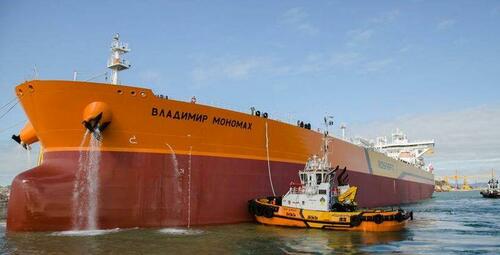
By Charles Kennedy of OilPrice.com
Russia has started diverting its LNG cargoes away from the Suez Canal and is using the longer route to China via the Cape of Good Hope in Africa, amid a higher risk of Houthi attacks in the Red Sea, according to LSEG data cited by Reuters on Wednesday.
The longer route from Russia’s Yamal LNG project to China via Africa instead of the Suez Canal adds around 10 days to the travel time for LNG cargoes to reach their destinations in China and return to Russia, tying up more LNG tankers for longer periods at sea.
This adds to recent struggles of Russia’s top LNG exporter, Novatek, which has yet to begin shipments from its new export project, Arctic 2 LNG, due to a lack of ships amid tightened U.S. sanctions on the project.
Two of the world’s biggest LNG exporters, the United States and Qatar halted shipments via the Red Sea and the Suez Canal earlier this year. Qatar paused LNG cargo journeys through the Suez Canal in the middle of January, but it assured customers and the market that its LNG output is uninterrupted and Europe should expect longer delivery times.
“While the ongoing developments in the Red Sea area may impact the scheduling of some deliveries as they take alternative routes, LNG shipments from Qatar are being managed with our valued buyers,” QatarEnergysaid in January.
Now Russia is also avoiding the Red Sea, per LSEG data quoted by Reuters. Several tankers have already used the longer route to China, while vessels that delivered in December LNG to China from Yamal via the Suez Canal are now heading back to Russia via the Cape of Good Hope, according to the data.
Last month, some tankers transporting Russian fuels started to avoid the Suez Canal route to Asia as ship-tracking data showed operators of vessels carrying Russian oil products may have reached the risk tolerance for passing close to Houthi missiles in the Red Sea and the Gulf of Aden.
By Charles Kennedy of OilPrice.com
Russia has started diverting its LNG cargoes away from the Suez Canal and is using the longer route to China via the Cape of Good Hope in Africa, amid a higher risk of Houthi attacks in the Red Sea, according to LSEG data cited by Reuters on Wednesday.
The longer route from Russia’s Yamal LNG project to China via Africa instead of the Suez Canal adds around 10 days to the travel time for LNG cargoes to reach their destinations in China and return to Russia, tying up more LNG tankers for longer periods at sea.
This adds to recent struggles of Russia’s top LNG exporter, Novatek, which has yet to begin shipments from its new export project, Arctic 2 LNG, due to a lack of ships amid tightened U.S. sanctions on the project.
Two of the world’s biggest LNG exporters, the United States and Qatar halted shipments via the Red Sea and the Suez Canal earlier this year. Qatar paused LNG cargo journeys through the Suez Canal in the middle of January, but it assured customers and the market that its LNG output is uninterrupted and Europe should expect longer delivery times.
“While the ongoing developments in the Red Sea area may impact the scheduling of some deliveries as they take alternative routes, LNG shipments from Qatar are being managed with our valued buyers,” QatarEnergysaid in January.
Now Russia is also avoiding the Red Sea, per LSEG data quoted by Reuters. Several tankers have already used the longer route to China, while vessels that delivered in December LNG to China from Yamal via the Suez Canal are now heading back to Russia via the Cape of Good Hope, according to the data.
Last month, some tankers transporting Russian fuels started to avoid the Suez Canal route to Asia as ship-tracking data showed operators of vessels carrying Russian oil products may have reached the risk tolerance for passing close to Houthi missiles in the Red Sea and the Gulf of Aden.
Loading…






